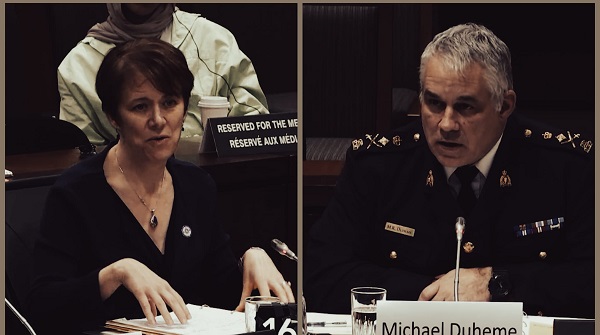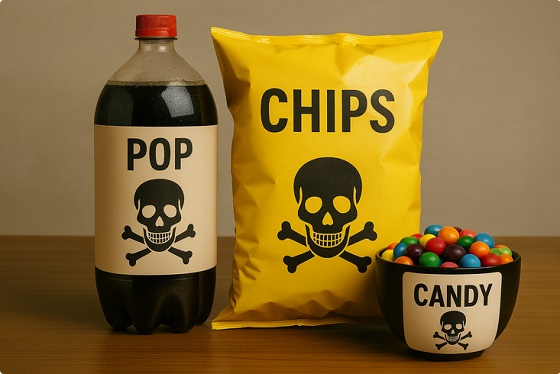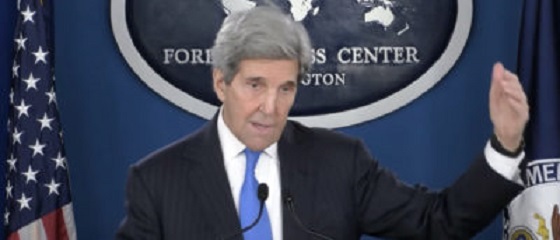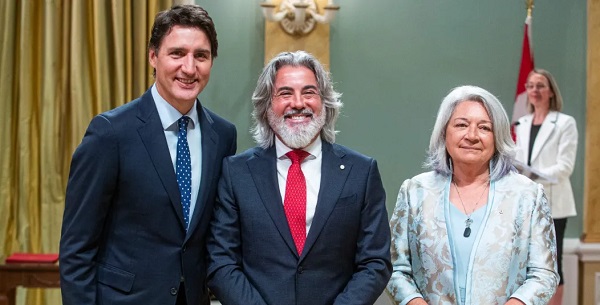National
Fentanyl, Firearms, and Failures: Canada’s Border in Crisis Mode

Opposition Exposes Legislative Gaps and Diplomatic Tensions as Trudeau Government Defends Record
In the latest session of the Standing Committee on Public Safety and National Security (SECU), the Trudeau government’s border security strategy faced fierce scrutiny.
MPs from the Conservative Party, Bloc Québécois, and NDP unleashed a barrage of criticism, exposing deep flaws in how Canada handles fentanyl trafficking, organized crime, and illegal migration. Witnesses from the Canada Border Services Agency (CBSA) and Royal Canadian Mounted Police (RCMP) offered opening statements aimed at highlighting their agencies’ efforts but quickly found themselves on the defensive, trying to justify their performance amid systemic failures.
CBSA and RCMP: Opening Statements Outline Growing Challenges
CBSA President Erin O’Gorman opened the SECU meeting with what can only be described as a pre-packaged, self-congratulatory performance. She boasted about “proactive” border security measures, highlighting joint operations with U.S. Customs and Border Protection and investments in drones and sensors. Let me translate that for you: a handful of success stories sprinkled with just enough tech jargon to distract from the gaping holes in Canada’s border defenses.
RCMP Commissioner Michael Duheme followed suit, painting a rosy picture of collaboration through Integrated Border Enforcement Teams (IBETs) and intelligence-sharing with the U.S. He acknowledged the challenges of tackling synthetic drugs like fentanyl but stopped short of explaining why Canada still lacks the resources to do so effectively. It was the same tired tune—effort without impact, talking points without solutions.
But the cracks in their narrative were impossible to miss. Both officials hinted at the enormity of the task they face and the glaring limitations of current resources and laws. And as the opposition MPs made clear, the gaps in leadership and accountability couldn’t be ignored. For all the talk of “progress,” the testimony revealed a border security system teetering on the edge of failure.
Organized Crime: Exploiting Systemic Weaknesses
Testimony revealed the alarming extent to which organized crime syndicates exploit Canada’s border vulnerabilities. Commissioner Duheme admitted that smugglers are using well-established routes to move firearms, fentanyl, and other contraband. Conservative MP Dane Lloyd wasted no time zeroing in on this issue, pointing out that while 750 firearms have been seized in 2024, countless others continue to flood Canadian streets, fueling gang violence and crime.
But it didn’t stop there. O’Gorman acknowledged that stolen Canadian vehicles are regularly smuggled out of the country, with some linked to terrorism financing. She admitted that CBSA’s enforcement efforts are hampered by a glaring legislative gap: ports are not legally required to provide inspection spaces for exports. Lloyd slammed this lack of oversight, declaring, “How can this government allow stolen vehicles to fund terrorism while ignoring calls for mandatory inspections?”
Fentanyl Crisis: A Growing Threat
The fentanyl epidemic emerged as another key issue, with MPs challenging the adequacy of current policies. O’Gorman highlighted CBSA’s success in seizing 4.9 kilograms of fentanyl in 2024, most of which was destined for Europe rather than the U.S. However, she acknowledged that small shipments of fentanyl precursors—dual-use chemicals legally imported and diverted to illicit production—remain a significant challenge.
NDP MP Alistair MacGregor pressed the witnesses on why the government has not tightened regulations on precursors. “We know how these chemicals are being exploited, yet the system remains open to abuse,” he said. RCMP Commissioner Duheme supported calls for stronger regulations, noting that criminal networks are becoming increasingly sophisticated in circumventing existing controls.
Conservative MP Doug Shipley didn’t hold back in his critique of the Trudeau government’s apparent complacency when it comes to border security. Referencing President-Elect Donald Trump’s scathing comments about Canada’s role in the U.S. opioid crisis, Shipley’s line of questioning cut straight to the heart of the issue: why does the government only react when faced with external pressure?
“Why does it take U.S. pressure and Trump’s rhetoric to get this government to act?” Shipley demanded, pointing to a troubling pattern where meaningful action on key issues like fentanyl trafficking only occurs after international embarrassment. The timing of Canada’s recent policy adjustments, including visa tightening and enforcement boosts under the Safe Third Country Agreement, raises serious questions about whether these moves were proactive measures or hasty reactions to avoid diplomatic fallout.
Shipley underscored the growing perception that the Trudeau government is more concerned with managing optics than tackling the underlying problems. “We have a border security crisis that has been ignored for years,” he said. “The Liberals have known about these issues—the fentanyl, the illegal crossings, the smuggling—and yet, nothing changes until a spotlight is shone on Canada’s failures.”
The backdrop of Trump’s rhetoric added fuel to the fire. His comments have not only strained Canada-U.S. relations but also amplified the stakes, with the threat of economic consequences like tariffs looming in the background. Shipley’s frustration echoed a broader sentiment among opposition MPs: that Canada’s leadership lacks the urgency and resolve to address border security challenges head-on, instead waiting for external forces to dictate the agenda.
The question Shipley posed wasn’t just rhetorical—it struck at the core of a government that has repeatedly been accused of putting politics over public safety. And in a system where criminal networks and traffickers are thriving, the consequences of inaction are no longer hypothetical—they’re devastatingly real.
Illegal Migration and Diplomatic Tensions
Illegal migration across the Canada-U.S. border also came under intense scrutiny. Bloc MP Kristina Michaud raised concerns about the surge in southbound crossings, which peaked at 7,000 individuals in mid-2024, a 680% increase since 2015. Although O’Gorman pointed to policy changes like visa tightening and the expanded Safe Third Country Agreement (STCA) as reasons for recent declines, opposition MPs remained skeptical.
Conservatives also linked the migration issue to potential diplomatic fallout with the U.S., particularly Trump’s proposed 25% tariffs on Canadian goods. “If this government can’t control the border, how can we expect to maintain good relations with our largest trading partner?” asked MP Glen Motz.
Canada’s Border Crisis: Solutions Are Clear, Leadership Is Missing
Let’s be real: the state of Canada’s border security isn’t just a policy issue; it’s a crisis. But if we’re going to have an honest conversation about solutions—and not just rhetoric—then we need to ask tough questions about what’s really required to fix this mess.
First, funding. The government loves to talk about its investments, but where is the money actually going? Testimony at SECU made it clear: the agencies on the front lines, like CBSA and the RCMP, are being asked to do more with less. They’re intercepting firearms, stolen vehicles, and fentanyl shipments, but they’re stretched thin. If we want real results, we need to ensure funding increases are targeted—not just wasted on bureaucracy. Drones, sensors, and data-sharing systems need to be deployed across the board, not in isolated pockets.
Then there’s the legislation. Canada’s laws are riddled with loopholes that make life easier for smugglers and harder for law enforcement. Case in point: ports aren’t even required to provide inspection spaces for exports. Let me repeat that—criminals are smuggling stolen vehicles and contraband out of the country because our laws don’t demand basic oversight at our ports. This isn’t rocket science. Mandate those inspections. Close the gaps on precursor chemicals. Hold shipping companies accountable. What’s the holdup?
And finally, diplomacy. The Liberals love to brand themselves as global players, yet our closest ally—the United States—is threatening tariffs because they don’t think Canada is doing enough on border security. Instead of caving to political pressure, how about showing some backbone? Share the data. Prove our contributions. Demand that the U.S. work with us as partners, not as scapegoats. But that requires leadership—real leadership—which seems to be in short supply in Ottawa.
The solutions are on the table. What’s missing is the political will to act. This isn’t just about protecting our borders; it’s about protecting Canadian families, Canadian jobs, and Canadian sovereignty. If Trudeau’s government can’t deliver, it’s time for leadership that can.
Excuses vs. Accountability on Border Security
When it comes to Canada’s border security, the political divide couldn’t be clearer. On one side, you have the Trudeau Liberals, spinning their tired narrative of progress, insisting they’ve done enough to secure our borders. On the other, you’ve got the opposition—Conservatives, Bloc, and NDP MPs alike—hammering away at the glaring failures of this government. And let me tell you, the contrasts are striking.
The Liberals came to this SECU meeting armed with buzzwords. They touted investments in drones, sensors, and new technologies. Liberal MP Anita Vandenbeld claimed these measures have led to “real results,” pointing to declines in illegal crossings and seizures of fentanyl. Sounds good on paper, right? But dig a little deeper, and you’ll see the cracks.
Conservative MPs like Doug Shipley and Dane Lloyd weren’t buying it. Shipley grilled witnesses on why, despite all this so-called progress, southbound illegal crossings into the U.S. are up 680% since 2015. “Why does this government always wait for a crisis before taking action?” he asked. Lloyd, meanwhile, exposed how criminals are exploiting Canada’s ports to smuggle stolen vehicles overseas—vehicles that fund international terrorism. And what’s the Liberal response? More consultations, more discussions. In other words, nothing.
Then there’s the Bloc’s Kristina Michaud. She hammered away at the government’s inability to close legislative gaps, like mandating export inspections at ports. Michaud even questioned whether the Liberals have the political will to enforce their own policies. That’s a devastating critique from Quebec’s representative, and it highlights the regional frustrations with Ottawa’s top-down approach.
Even the NDP, who often side with the Liberals, weren’t letting them off the hook. Alistair MacGregor zeroed in on fentanyl precursors, pointing out how weak regulations allow criminal networks to exploit Canada’s legal system. “When will this government stop talking about solutions and start implementing them?” he demanded. A fair question, given that these loopholes have existed for years.
So here’s the divide: the Liberals are clinging to their talking points, pretending their investments are enough, while the opposition is laser-focused on the systemic failures, legislative inaction, and diplomatic blunders that have allowed this crisis to spiral.
It’s a classic case of two narratives—one selling excuses, the other demanding accountability. And the real tragedy? While Ottawa debates, Canadian families are left to deal with the consequences of illegal drugs, rising crime, and stolen property funding terrorism. This isn’t just a political debate; it’s a national emergency.
Final Thoughts
Canada is a nation built on resilience, hard work, and a commitment to protecting its people. But what we’re seeing now is a betrayal of those values. Our borders aren’t just weak—they’re dangerously open to exploitation by criminals, traffickers, and opportunists. The SECU hearings made one thing abundantly clear: the Trudeau government has failed to defend the integrity of this country.
Lack of resources. Outdated laws. Political inaction. This isn’t governance—it’s negligence. While the CBSA and RCMP are doing everything they can with the tools they’re given, it’s not enough. Why? Because the leadership they need is nowhere to be found. Instead, we have Justin Trudeau—Ottawa’s talking head—more concerned with photo ops and platitudes than with keeping Canadians safe.
This is a system designed to fail, and Canadians are paying the price. It doesn’t have to be this way. With real leadership—leadership that prioritizes security, accountability, and action—we can fix this. We can close the legislative gaps, give our border agencies the resources they need, and restore Canada’s sovereignty.
It’s time to demand more from Ottawa. Not excuses, not buzzwords, but real, tangible change. Because this isn’t just about border security—it’s about protecting Canadian families, defending our economy, and safeguarding the values that define us as a nation. Canada deserves better. And if Justin Trudeau can’t deliver, then it’s time for someone who can.
Subscribe to The Opposition with Dan Knight .
For the full experience, upgrade your subscription.
Energy
Canadians will soon be versed in massive West Coast LPG mega-project

Welcome to the world of REEF
Most Canadians, know who Connor McDavid is.
Most Canadians, know who Connor Bedard is.
And, well … most Canadians know who Howie Mandel is, right?
Household words.
But do any Canadians, know what REEF is? Probably not.
The Ridley Island Energy Export Facility project, a large-scale terminal near Prince Rupert, B.C., being built by AltaGas to export liquefied petroleum gas (LPG) and other bulk liquids to global markets.
Did you know it is providing valuable propane to Japan? No, not for barbecues, but for crucial energy demands in the Asian nation.
Japan uses propane (LP gas) for a wide range of purposes, including household use for cooking, water heating, and room heating, as well as for a majority of taxis, industrial applications, and as a raw material for town gas production.
Construction is progressing, with a target startup around the end of 2026. The project involves building significant infrastructure, including large storage tanks.
And it just so happens that Resource Works CEO Stewart Muir, paid a visit this past week to get a close-up look at a part of Canada’s export story that almost nobody talks about: a brand-new accumulator tank built to hold chilled propane and butane.
“It’s the largest of its kind anywhere. Two more are on the way, and together they’ll form a critical piece of the AltaGas Ltd. REEF project,” Muir said in a report.
”What stood out to me is the larger pattern: projects like this only happen because of the crown jewel of the B.C. economy — the Montney Formation.”
“It’s the triple-word-score of Canadian resource development: LNG, valuable natural gas liquids like propane, and the diluent streams that help unlock Canada’s single biggest export category, crude oil.”
Like the oilsands, the industry has long known about the Montney formation, which stretches 130,000 square kilometres in a football-shaped diagonal from northeast British Columbia into northwest Alberta.
According to CBC News, underneath this huge tract of land, the National Energy Board (NEB) estimates there’s 90 billion barrels of oil equivalent (boe), most of it natural gas. That’s more than half the size of the oilsands, yet the Montney has received only a fraction of the attention, at least from the public at large.
For oil and gas types, the gold rush is on.
Without question, and despite the ire of green groups who seem to be against any kind of resource development in Canada, the Montney is the quiet force multiplier behind local jobs, municipal tax bases, and the national balance of trade.
And it’s all being done at the highest environmental standard, with producers like Tourmaline Oil Corp already posting a 41% reduction in CO2 emission intensity and a target of 55% less methane emission intensity.
”Congrats to AltaGas for pushing this project forward, and a nod as well to other major employers on the North Coast — Trigon, CN and Pembina, writes Muir.
“Quietly and steadily, they’re building the future prosperity of Canadians. And thanks to Mayor Herb Pond, who took the time to walk us through the regional dynamics that make this corridor such a strategic asset.”
Muir was gobsmacked by the size of the project.
Sources say Alberta’s midstream bottleneck and rapid growth of Shale oil and gas exploration and production, has created an absolute glut in ethane, propane and butane. Ridley Island takes this glut and transports it to the Prince Rupert region by railcar and exports to Asian markets.
Ridley Island’s current export capacity of 92,000 bpd is undergoing aggressive expansion to growth by another 115,000 bpd over the next few years in two more phases of construction.
Recent images detail active construction efforts of the storage, jetty and rail infrastructure.
Alas, every issue that threatens to derail the ambitions of Canada’s oil and gas industry — access to market, First Nations land rights, public acceptance of infrastructure projects and, especially, the climate consequences of burning fossil fuels — is writ large in the Montney.
There are now seven separate lawsuits, and threats of further escalation, centred on claims by the Lax Kw’alaams and Metlakatla First Nations (collectively the Coast Tsimshian) that they were misled and lied to by the Crown when they agreed to developments on their traditional lands at Prince Rupert, John Ivison at the National Post reported.
The dispute over a future propane export facility at the port has spread to other resource projects, and the two First Nations have launched lawsuits against the Ksi Lisims LNG project that was one of the Liberal government’s major projects announced by the prime minister last week.
Further, the conflict threatens to negatively impact any plans Ottawa and the province of Alberta have to build an oil pipeline to the port.
Prime Minister Mark Carney’s recent announcements giving the green light to Alberta’s oil & gas industry has stirred the energy pot to new levels.
B.C. Premier David Eby — who prides himself on Indigenous virtue signalling — is pissed off. It appears he was largely left out of the loop and he is digging in.
Eby said the B.C. government needs to make sure this pipeline project doesn’t become an “energy vampire.”
“With all of the variables that have yet to be fulfilled — no proponent, no route, no money, no First Nations support — that it cannot draw limited federal resources, limited Indigenous governance resources, limited provincial resources away from the real projects that will employ people,” Eby added.
B.C.’s Coastal First Nations also say they will use “every tool in their toolbox” to keep oil tankers out of the northern coastal waters.
It is now apparent that all roads, or, shall we say, pipelines, lead to Prince Rupert.
The feds now face an imposing uphill battle, to leverage their standing as a regulator and resolve a dispute that threatens Canada’s crucial growth agenda.
— with files from CBC News, National Post
THE MAKICHUK REPORT is free today.
But if you enjoyed this post, you can tell THE MAKICHUK REPORT that their writing is valuable by pledging a future subscription.
You won’t be charged unless they enable payments.
Food
Canada Still Serves Up Food Dyes The FDA Has Banned

From the Frontier Centre for Public Policy
By Lee Harding
Canada is falling behind on food safety by continuing to allow seven synthetic food dyes that the United States and several other jurisdictions are banning due to clear health risks.
The United States is banning nine synthetic food dyes linked to health risks, but Canada is keeping them on store shelves. That’s a mistake.
On April 22, 2025, the U.S. Department of Health and Human Services and the Food and Drug Administration (FDA) announced they would ban nine petroleum-based dyes, artificial colourings that give candies, soft drinks and snack foods their bright colours, from U.S. foods before 2028.
The agencies’ directors said the additives presented health risks and offered no nutritional value. In August, the FDA targeted Orange B and Citrus Red No. 2 for even quicker removal.
The good news for Canada is that Orange B was banned here long ago, in 1980, while Citrus Red No. 2 is barely used at all. It is allowed at two parts per million in orange skins. Also, Canada reduced the maximum permitted level for other synthetic dyes following a review in 2016.
The bad news for Canadians is that regulators will keep allowing seven dyes that the U.S. plans to ban, with one possible exception. Health Canada will review Erythrosine (called Red 3 in the U.S.) next year. The FDA banned the substance from cosmetics and drugs applied to the skin in 1990 but waited decades to do the same for food.
All nine dyes targeted by the FDA have shown evidence of tumours in animal studies, often at doses achievable through diet. Over 20 years of meta-analyses also show each dye increases the risk of attention deficit hyperactivity disorder in eight to 10 per cent of children, with a greater risk in mixtures.
At least seven dyes demonstrate broad-spectrum toxicity, especially affecting the liver and kidneys. Several have been found to show estrogenic endocrine effects, triggering female hormones and causing unwanted risks for both males and females. Six dyes have clinical proof of causing DNA damage, while five show microbiome disruption in the gut. One to two per cent of the population is allergic to them, some severely so.
The dyes also carry a risk of dose dependency, or addiction, especially when multiple dyes are combined, a common occurrence in processed foods.
U.S. research suggests the average child consumes 20 to 50 milligrams of synthetic dyes per day, translating to 7.3 to 18.25 kilograms (16.1 to 40.2 pounds) per year. It might be less for Canadian kids now, but eating even a “mere” 20 pounds of synthetic dyes per year doesn’t sound healthy.
It’s debatable how to properly regulate these dyes. Regulators don’t dispute that scientists have found tumours and other problems in rats given large amounts of the dyes. What’s less clear are the implications for humans with typical diets. With so much evidence piling up, some countries have already taken decisive action.
Allura Red (Red 40), slated for removal in the U.S., was previously banned in Denmark, Belgium, France, Switzerland, Sweden and Norway. However, these countries were forced to accept the dye in 2009 when the European Union harmonized its regulations across member countries.
Nevertheless, the E.U. has done what Canada has not and banned Citrus Red No. 2 and Fast Green FCF (Green 3), as have the U.K. and Australia. Unlike Canada, these countries have also restricted the use of Erythrosine (Red 3). And whereas product labels in the E.U. warn that the dyes risk triggering hyperactivity in children, Canadians receive no such warning.
Canadian regulators could defend the status quo, but there’s a strong case for emulating the E.U. in its labelling and bans. Health Canada should expand its review to include the dyes banned by the E.U. and those the U.S. is targeting. Alignment with peers would be good for health and trade, ensuring Canadian manufacturers don’t face export barriers or costly reformulations when selling abroad.
It’s true that natural alternatives present challenges. Dr. Sylvain Charlebois, a food policy expert and professor at Dalhousie University, wrote that while natural alternatives, such as curcumin, carotenes, paprika extract, anthocyanins and beet juice, can replace synthetic dyes, “they come with trade-offs: less vibrancy, greater sensitivity to heat and light, and higher costs.”
Regardless, that option may soon look better. The FDA is fast-tracking a review of calcium phosphate, galdieria blue extract, gardenia blue, butterfly pea flower extract and other natural alternatives to synthetic food dyes. Canada should consider doing the same, not only for safety reasons but to add value to its agri-food sector.
Ultimately, we don’t need colour additives in our food at all. They’re an unnecessary cosmetic that disguises what food really is.
Yes, it’s more fun to have a coloured candy or cupcake than not.What’s less fun is cancer, cognitive disorders, leaky gut and hormonal disruptions. Canada must choose.
Lee Harding is a research fellow for the Frontier Centre for Public Policy.
-

 Daily Caller2 days ago
Daily Caller2 days agoJohn Kerry Lurches Back Onto Global Stage For One Final Gasp
-

 Food16 hours ago
Food16 hours agoCanada Still Serves Up Food Dyes The FDA Has Banned
-

 National1 day ago
National1 day agoEco-radical Canadian Cabinet minister resigns after oil deal approved
-

 Addictions17 hours ago
Addictions17 hours agoManitoba Is Doubling Down On A Failed Drug Policy
-

 Alberta17 hours ago
Alberta17 hours agoNet Zero goal is a fundamental flaw in the Ottawa-Alberta MOU
-

 Alberta12 hours ago
Alberta12 hours agoKeynote address of Premier Danielle Smith at 2025 UCP AGM
-

 COVID-1917 hours ago
COVID-1917 hours agoFDA says COVID shots ‘killed’ at least 10 children, promises new vaccine safeguards
-

 National2 days ago
National2 days agoAlleged Liberal vote-buying scandal lays bare election vulnerabilities Canada refuses to fix









